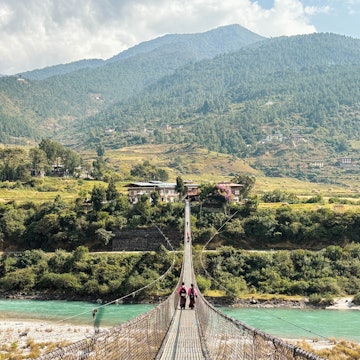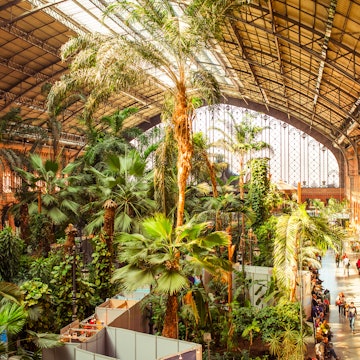

A sustainable future might mean forgoing air travel for some adventures © Studio Muti / Lonely Planet
I’m a travel journalist and I’ve given up flying. It might’ve been the best thing I’ve done – both for myself and the planet.
If I knew it was to be my last flight, I would've flown somewhere more remote than Mallorca.
Antarctica or Papua New Guinea, maybe: once-in-a-lifetime destinations that require serious effort to reach. I might have taken a private plane to French Polynesia, sipping Champagne the whole way and then sliding down the inflatable evacuation slide by way of a final hurrah.
But the Balearics? It was my sixth visit. Like the 13.6 million other tourists who wing their way to Spain’s chain of sunbaked seductresses each year, I love the place. The quiet coves. Those golden town squares. Ice-cold beers in the open-oven warmth of a soft Mediterranean evening. All of that just a £4.99 flight away.
But back in 2018, when I took that flight, I hadn’t yet seen The Graph, a line chart plotting average global temperatures for the last 11,000 years. It is alarming: For millennia, the Earth’s temperature subtly fluctuates like a mountain range. From afar it is like looking out across the Alps: a 0.1°C increase here, a 0.2°C decrease, sloping ridges and subtle summits. And then the industrial era begins. Suddenly the line blasts northward like a rocket, with temperatures rising by some 0.7°C in a century. I hadn’t yet delved into the extensive research around climate change, as I promenaded along Port de Pollença at dusk or considered its urgency while cliff-jumping at Sa Calobra.
The scale of the problem
Once you even glance at the data, it’s hard to ever look away. When it comes to carbon emissions, the aviation industry accounts for 2% of total emissions worldwide, and 12% of the fumes emitted by transportation. So while its emissions aren’t as bad as, say, cruise ships (in 2019 Carnival ships produced more pollution than all of Europe’s cars combined), planes are still accountable for an almighty belch.
One major issue is that number is predicted to increase. Pre-pandemic, passenger numbers were growing in every country on the planet. Data from the World Bank showed those in the US took nearly a billion flights in 2019. And those taking flights tended to be frequent flyers. In the UK, 15% of people took 70% of flights, a pattern repeated in other countries.
The outcome? The Global North is responsible for 92% of the world’s excess carbon emissions. Yet the Global South is where the impact of climate change is most acutely felt. Viewed through that prism, flying may be quick, convenient and, for great swathes of the planet, relatively affordable. But for a holiday, it’s also pretty non-essential.
Slow travel – the new sustainable way of exploring the world
A travel writer, grounded
It wasn’t a tough decision to stop flying, but it was an impractical one. As a travel writer, I often need to get to different countries quickly and conveniently. I’ve traveled to six continents and more than 45 countries, taking more than 100 flights. Going by plane is etched into the job description: there were long weekends in China; 45-minute domestic flights across India; a short hop from Brazil to Bolivia.
I had taken other steps in my daily life, from carrying a reusable water bottle to doing all my gardening by hand, and not flying seemed like another quick win in terms of reducing my personal carbon emissions. It’s now nearly four years since I've been grounded. In the meantime, people much smarter than me (NASA, the UK Department for Transport, Harvard, the UN, 99% of all climate scientists) have rerun the figures and – as the IPCC report concluded – this is the last call to save humanity.
It’s important to note that going flight-free hasn’t stopped me from traveling. If we don’t go out and see the world, we won’t be aware of what we are going to lose. We need to slow down how we travel, to allow us to experience nature, encounter awe, engage with strangers. This is what makes us human. It helps us foster understanding. And it’s all available without flying.
How we can be better travelers in a post-COVID world

A slower more sustainable future
Thankfully, I’m not the only one to see the potential of flight-free travel. Look, for example, at companies like Slow Ways, an online community connecting each town and city in Great Britain via a network of walking paths. By bringing together unused footpaths and little-known back routes, it is now even easier to move about the country carbon-free.
We’re even seeing the first, flight-free travel agencies appear, such as Byway Travel, which offers slow travel trips to Sicily and the Côte d'Azur. In Europe, meanwhile, blueprints are being drawn up to expand the night train network across the Continent.
It’s an exciting time to be traveling. There’s a new company set to ply a 70-day London to Delhi bus route. Now, that’s an adventure. As was Greta Thunberg’s Atlantic Ocean crossing by yacht in 2019.
It’s the convenience that’s killing us. We forget that humans are only a very tiny part of this very vast planet and we need to learn to better traverse the very thing that sustains us.
So what does mean for other travelers? That we should queue up at boarding gates to publicly shame fliers? That we should quit our jobs in order to take slow and steady three-month trips across continents by foot? That latter exercise sounds nice, but it won't work for everyone. The tourism industry is a juggernaut. It employs one in 10 of us.
Instead, we need to look at flight-free travel not as dogma but as a whole new frontier. Flying less is surely a good place to start. Staying in destinations longer is an improvement. Getting around by public transport or your own steam is ideal.
How to choose an epic hike on any continent in the world
But the fact of the matter is this: The planet needs to end the use of fossil fuels – and fast. Traveling without flying is one way to do that. It puts our money where our mouth is, which always changes behavior, and it gives me hope that we can preserve some of the world's most treasured sights of future generations.
Some aviation experts believe that improved technology could be the answer – and they may be right. Lots of brains are already working on creating carbon-free commercial flights at companies like Airbus and Rolls Royce. But the new planes aren’t ready yet and we simply can’t replace the 40 million or so flights we currently take each year anytime in the near future.
So for now, perhaps the best way forward is in remembering the forgotten ways of doing things? Traveling closer to home. Cycling, walking, sailing. That’s how I will be moving around the world. I take holidays that put me in harmony with the planet and allow me to see the world in real-time. When I travel on a human level and at a human pace, it helps me see the world in focus.
This summer, I hiked across the St David's Head in Pembrokeshire, where Wales runs out of land. It was wet and rainy, a full house of Britain’s clichéd summers, but it was also beautiful.
Why I am slow travelling through Asia with my daughter

From up high I could see a patchwork quilt of farmer’s fields, different crops in green and yellow and red. Then there was the purple swell of St George’s Channel, the body of water that divides the UK and Ireland. It coughed and sputtered against the cliffs below. It had all the drama and natural majesty I needed to remind me of my place on this planet – and it was only a short train ride away.
Still, I expect to head back to Mallorca soon, taking a train from London to Paris and onto Barcelona. It’s then an overnight ferry to Mallorca. It’ll take 36 hours or so in total, plenty of time to rest and recharge. It may not be Antarctica or Papua New Guinea, but I’d love to tell you about it one day.























